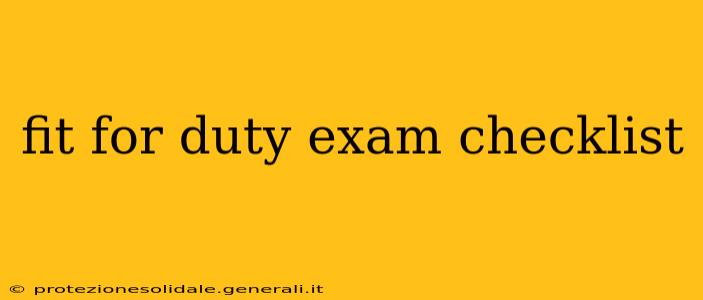A "fit for duty" exam, also known as a fitness for work examination, is a crucial process ensuring employees can safely perform their job duties. This checklist provides a comprehensive overview of what's involved, addressing common questions and concerns. Understanding the process benefits both employers and employees in maintaining a safe and productive workplace.
What is a Fit for Duty Exam?
A fit for duty exam is a medical assessment designed to determine if an employee is physically and mentally capable of performing their job safely and effectively. This assessment is often triggered by specific events, such as a workplace injury, a return-to-work evaluation after an illness or injury, or a pre-employment screening for certain roles. The scope of the exam varies greatly depending on the job's demands and any specific concerns.
What are the Different Types of Fit for Duty Exams?
The type of fit for duty exam depends on several factors, including the job's physical demands, the employee's health concerns, and the relevant regulations. Some common types include:
- Pre-employment exams: These are conducted before an employee starts a new job to ensure they are physically and mentally fit for the role.
- Post-injury exams: These are performed after a workplace injury to determine if the employee is ready to return to work, perhaps with modifications.
- Periodic health exams: These are conducted at regular intervals for certain jobs, such as those involving hazardous materials or heavy machinery.
- Return-to-work exams: These are conducted after an employee has been absent from work due to illness or injury to assess their fitness for resuming duties.
- Substance abuse testing: This may be part of a fit for duty assessment, especially in safety-sensitive roles, where drug or alcohol use could significantly impair judgment or physical abilities.
What Should Be Included in a Fit for Duty Exam Checklist?
A comprehensive fit for duty exam checklist should include the following:
I. Employee Information:
- Employee Name & ID Number
- Job Title and Description
- Date of Exam
- Reason for Exam (e.g., pre-employment, post-injury, return-to-work)
- Relevant Medical History (provided by the employee with consent)
II. Medical Examination:
- Vital Signs: Blood pressure, heart rate, temperature, respiratory rate.
- Physical Examination: Assessment of musculoskeletal system (range of motion, strength, reflexes), neurological system (mental status, coordination), cardiovascular system, respiratory system, etc., relevant to the job demands.
- Specific Tests: Depending on the job and the employee's condition, this may include vision tests, hearing tests, pulmonary function tests, drug testing, etc.
- Review of Medical Records: Review of prior medical records, if relevant and with the employee's consent.
III. Job-Specific Assessment:
- Job Demands Analysis: A detailed description of the physical and mental demands of the job (lifting, reaching, bending, mental acuity, etc.).
- Functional Capacity Evaluation (FCE): If necessary, an FCE will objectively assess the employee's physical capabilities to determine if they can meet the job demands.
IV. Physician's Report:
- Assessment of Fitness for Duty: Clear statement indicating whether the employee is fit for duty, with limitations if any.
- Recommendations: Specific recommendations for work restrictions, modifications, or further evaluation.
- Physician's Signature and Date.
V. Legal and Ethical Considerations:
- Employee Consent: Obtain informed consent from the employee before conducting any medical examination or disclosing medical information.
- Confidentiality: Maintain the confidentiality of all medical information in accordance with relevant privacy laws (HIPAA, etc.).
- Documentation: Maintain detailed and accurate records of the examination and the physician's findings.
What Questions Should Be Asked During a Fit for Duty Exam?
The physician will tailor the questions to the specific situation but may include:
- Current Symptoms: Are you experiencing any pain, fatigue, dizziness, or other symptoms?
- Medication Use: Are you taking any medications?
- Recent Injuries or Illnesses: Have you recently experienced any injuries or illnesses?
- Substance Use: (Relevant to jobs with safety-sensitive aspects) Do you currently use alcohol or illicit drugs?
Who Conducts a Fit for Duty Exam?
Fit-for-duty exams are typically conducted by a qualified physician or healthcare professional, often with expertise in occupational medicine.
This checklist provides a framework. The specific elements and depth will vary based on the individual's job, the reason for the exam, and applicable regulations. Always ensure compliance with all relevant legal and ethical guidelines.
